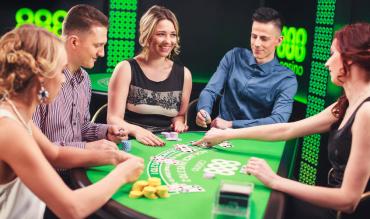Imagine you're dealt a stiff hand in blackjack such as 10-5 or 9-7 and the dealer has a 10 or an Ace face up. You'd love to exchange the lower card and take a chance at getting a 10 or Ace instead, wouldn't you? Would you pay for the privilege?
Conversely, would you accept a fee from the house to exchange the higher card instead? Those are the kinds of situations that arise in Blackjack XChange, now carving out a niche at online casinos.
There are many player-attractive features to XChange, but the defining characteristic is the opportunity to exchange cards.
Mind you, paying the price to XChange doesn't give you better odds than basic blackjack. At WizardofOdds.com, Michael Shackelford calculates that it's best to skip the XChange feature and just take advantage of some favorable blackjack rules.
But for those looking for a little intrigue, it's going to be awfully tempting to XChange when holding 10-6 and take a chance on improving on the 16, perhaps turning a stiff into a winner and maybe even creating a blackjack for a 3-2 payoff.
Making an Exchange
How much must you pay to exchange a good card and how much will you get to exchange a bad one? That depends on the cards and the odds of winning the hand. Different offers are made on different hands.
That feature makes XChange best suited for online play where game programming can display prices instantly. In live play, a dealer wouldn't be able to keep the game moving while quoting prices on every card.
In a run through a demo version with a $3 imaginary wager on the line, a player hand was Ace-2 and the dealer showed a 10. The player could just play the hand as dealt with hit, stand or double down options, but also could either buy a replacement for the 2 for $1.64 or sell the Ace for 40 cents and get another card.
In another hand, with King-4 against a King, the player could hit, stand, double, buy a replacement for the 4 for $1.64 or sell the King for 55 cents.
The exchange options are offered with more than two cards, too. After hitting King-4 against King and drawing a 2, the display said the player could pay 62 cents to exchange the King, 49 cents to exchange the 4 or 23 cents to exchange the 2.
Those prices are deducted from your credit meter and are not added or subtracted from your wager. If you bet $3 and pay $1.64 for a new card, you still have a $3 bet working,
XChange offers end after four player cards. Once you're dealt a fifth card, you may no longer XChange. you also may not XChange after splitting pairs or doubling down. And after you XChange, you may not split or double.
It's all instant and easy online.

Player Favorable Rules
In addition to the XChange, several other rules variations on basic blackjack are in force.
- The dealer stands on all 17s, including soft 17.
- Blackjacks pay 3-2. That payoff applies even after XChanges. If you have King-4 pay to exchange the 4 and draw an Ace, the resulting King-Ace still brings a 3-2 payoff.
- The electronic dealer does check for blackjacks, and blackjacks stop play. No XChange prices are offered if the dealer has blackjack.
- Players may double down on any first two cards, including after splitting pairs.
- Players may split pairs only once for a total of two hands.
- After splitting Aces, players may hit or double down. That's a plus for players compared to most basic blackjack games, where you receive only one more card on each split Ace.
Under those rules and an infinite deck that is possible only with electronic play, WizardofOdds.com calculates a house edge of 0.37%. That's a pretty good blackjack game better than most you'll find in live casinos in an era of six-deck games where the dealer stands on soft 17.
Strategy Considerations
Card counters can do better in live casinos because you can't count an online game where all cards are available on every hand, but for basic strategy players the XChange rules are pretty good.
However, Shackelford calculated the XChanges cost players between 2.5% and 3%. That's higher than the 0.37% on the basic game, so he advises you to decline the XChange options.
Instead, you'll get the lowest house edge by following this version of basic strategy, which accounts for the infinite deck, dealer standing on all 17s, doubling on any two cards, including after splits and splitting only one time.
HARD HANDS:
- Hard 4 through 8: Always hit.
- Hard 9: Double against 3 through 6; otherwise, hit.
- Hard 10: Double against 2 through 9; hit against 10 or Ace.
- Hard 11: Double against 2 through 10; hit against Ace.
- Hard 12: Stand against 4, 5 or 6; otherwise, hit.
- Hard 13 through 16: Stand against 2 through 6; hit against 7 or higher.
- Hard 17 through 21: Always stand.
SOFT HANDS:
- Soft 12 is Ace-Ace. See the pair-splitting section.
- Soft 13: Double down against 6; otherwise, hit.
- Soft 14 and 15: Double against 5 or 6; otherwise, hit.
- Soft 16: Double against 4, 5 or 6; otherwise, hit.
- Soft 17: Double against 3, 4, 5 or 6; otherwise, hit.
- Soft 18: Double against 3, 4, 5 or 6; stand against 2, 7 or 8; hit against 9, 10 or Ace.
- Soft 19 through 21: Always stand.
PAIRS:
- 2, 2 or 3,3: Split against 2 through 7; hit against 8 or higher.
- 4,4: Split against 5 or 6; otherwise, hit.
- 5,5: Never split. Play this as a 10 and double down against 2 through 9 and hit against 10 or Ace.
- 6,6: Split against 2 through 6; hit against 7 or higher.
- 7,7: Split against 2 through 7; hit against 8 or higher.
- 8,8: Always split.
- 9,9: Stand against 7, 10 or Ace; split against all others.
- 10,10: Always stand.
- Ace, Ace: Always split.
Ultimately, though, most people who play XChange will use the feature and at least occasionally buy replacements. That's where the novelty of the game lies.
Just understand that you're spotting the house a little increase in its edge when you XChange. The prices on the XChanges are set so you pay more than the true odds of winning.
Also keep in mind that the cards you see on board give you no indication of any change in probabilities on the replacement. With an infinite deck, there is an infinite supply of 6s, for example. If you discard a 6, that does not diminish the chances of drawing another 6. The proportion of 6s remains as 1/13th of the deck.
That has a much smaller effect than the price to XChange. Be aware of that price and even if you want the intrigue of the replacement opportunity, pick your spots. The more you XChange, the more you add to the house edge.


